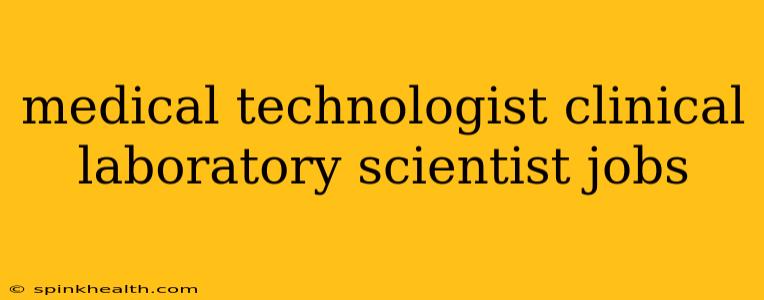The world of medical technology is a fascinating blend of science, precision, and compassion. At its heart are the dedicated professionals – Medical Technologists and Clinical Laboratory Scientists – who work tirelessly behind the scenes, analyzing samples and providing critical data that guides patient diagnoses and treatment. If you're curious about a career in this field, you've come to the right place. This article will explore the exciting world of medical technologist and clinical laboratory scientist jobs, answering your burning questions and shedding light on this essential role in healthcare.
What is the difference between a medical technologist and a clinical laboratory scientist?
This is a common question, and the answer is often subtle. In many places, the terms "medical technologist" and "clinical laboratory scientist" are used interchangeably. Both roles involve performing laboratory tests, analyzing results, and reporting findings to physicians. However, some regions or institutions might differentiate based on educational requirements or specific certifications. For instance, some jurisdictions might require a bachelor's degree for a Clinical Laboratory Scientist designation, while a Medical Technologist title might be granted with an associate's degree plus additional certifications. The core responsibilities remain consistent regardless of the title.
What are the day-to-day responsibilities of a medical technologist/clinical laboratory scientist?
Imagine a bustling city, a network of arteries and veins, where each drop of blood, each tissue sample, carries a story. You, as a medical technologist or clinical laboratory scientist, are the detective, unraveling the mysteries hidden within these samples. Your days might involve:
- Performing laboratory tests: This is the core of the job. You might use sophisticated equipment like automated analyzers, microscopes, and specialized instruments to conduct a wide variety of tests, ranging from basic blood counts and urinalysis to complex molecular diagnostics.
- Analyzing results: Raw data means nothing without interpretation. You'll carefully analyze the results of your tests, identifying abnormalities and ensuring accuracy. Precision and attention to detail are paramount here.
- Reporting findings: You'll prepare clear and concise reports for physicians, summarizing your findings and highlighting any significant results that can help in patient diagnosis and treatment.
- Maintaining quality control: Ensuring the accuracy and reliability of test results is crucial. You'll participate in quality control processes, calibrating equipment, maintaining records, and adhering to strict laboratory protocols.
- Troubleshooting equipment: Sometimes, machines malfunction. As a skilled professional, you'll be able to troubleshoot minor issues and know when to call in for specialized maintenance.
What kind of education and certification is required for medical technologist/clinical laboratory scientist jobs?
The educational pathway typically involves a bachelor's degree in medical technology, clinical laboratory science, or a related field. Many programs offer clinical rotations, giving you hands-on experience in different laboratory settings. After graduation, certification is often required or highly recommended. The American Society for Clinical Pathology (ASCP) and the American Medical Technologists (AMT) are two leading organizations that offer certifications, boosting your credibility and enhancing your job prospects.
What is the job outlook for medical technologists and clinical laboratory scientists?
The job outlook for medical technologists and clinical laboratory scientists is generally excellent. The healthcare industry is constantly expanding, and the demand for skilled laboratory professionals is expected to continue growing. As technology advances, new and more sophisticated tests are developed, requiring qualified personnel to operate and interpret the results. This ensures that the profession remains at the forefront of medical advancements, offering a dynamic and continuously evolving career path.
What salary can I expect as a medical technologist/clinical laboratory scientist?
Salary expectations vary based on experience, location, and employer. However, medical technologists and clinical laboratory scientists typically earn a competitive salary that reflects their highly specialized skills and the critical role they play in healthcare. Researching salary data specific to your region can give you a more accurate estimate.
Where can I find medical technologist/clinical laboratory scientist jobs?
Job opportunities can be found in a wide range of settings, including:
- Hospitals: This is a major employer, offering diverse opportunities in various laboratory departments.
- Clinical laboratories: Independent labs offer specialized testing services and often focus on specific areas.
- Research institutions: Many research facilities employ medical technologists and clinical laboratory scientists to conduct research and development.
- Pharmaceutical companies: These companies may have internal labs focused on quality control and product development.
- Government agencies: Public health agencies and regulatory bodies also employ laboratory professionals.
This overview provides a glimpse into the rewarding and challenging world of medical technologist and clinical laboratory scientist jobs. If you are drawn to science, precision, and helping others, this career path might be the perfect fit for you. Remember to research specific educational requirements and certification options in your region to take the next steps toward a fulfilling career in medical technology.

